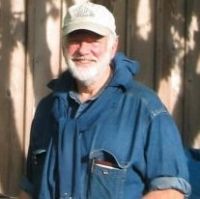Papa Pinot passes on

See below for Linda Murphy's contribution.
David Lett, the man who led Oregon into ambitious vine growing in general and the cuttings of Pinot Noir he planted in the 1960s (see below) in particular, died on Thursday night after a long illness. His passing was sufficiently important to inspire this tribute in today’s New York Times.
Having known him for well over 20 years, I was quite surprised to read that he was only 69 – so great was his stature and somewhat paternal nature already when I first met him and he showed me round the Willamette Valley on my first wine trip to Oregon. He was subsequently quite pleased, I think, that I chose Eyrie Vineyards Pinot Noir for my 1989 book Vintage Timecharts which looked in detail at the evolution of different wines, cunningly requiring me to conduct vertical tastings of some of the world’s finest wines (must do that again some time…).
I was very fond of him and something about the twinkle in his eye made me feel that there may have been some reciprocation. The last time I saw him was just over a year ago when I was filming in Oregon and purple pager Michel Alberty thoughtfully organised a ‘surprise dinner’ during my stay. The surprise turned out to be Oregon’s Papa Pinot and some great bottles from the family wine library. We took over the famous Nick’s Diner in McMinnville for a stunning yet intimate meal with David, the charming Diana and their son Jason.
David was already having great difficulty breathing and keeping warm so he had one of those clear tubes up his nose and wore a hat, which robbed him of some of his Father Christmas look. He enjoyed his reputation for being cantankerous, I think, but was charm itself that evening. More details to follow, but what an achiever that man was, to think of importing Pinot Noir cuttings into Oregon. And as for introducing Pinot Gris to American soil…!
He must have been so thrilled that his son Jason saw the light and came back to run Eyrie Vineyards from the 2005 vintage (the picture top left was taken just after David's last vintage, 2004). And what a kick he must have got from seeing his adopted state adopt his favourite vine variety.
Linda Murphy adds: In 1966, Lett drove from California to the Red Hills of Dundee in Willamette Valley with 3,000 vine cuttings from California vineyards and UC Davis, where he’d studied winemaking. With his wife, Diana, he founded The Eyrie Vineyards, and through sheer will and his belief that the cool, often wet Willamette Valley was the best site for growing Pinot Noir in the US, produced wines that encouraged Richard and Nancy Ponzi, Richard Erath, Susan and Bill Sokol-Blosser, and others to join him in Oregon.
Lett was so disheartened by his first Pinot Noir vintage, 1970, that he labelled it Spring Wine and sold it cheap. Subsequent vintages met his approval, and Lett’s 1975 South Block Reserve Pinot Noir beat all but one burgundy in two famous comparative tastings in Paris.
Lett farmed organically, though he didn’t think certification was necessary. He embraced vintage variation, believed that colour was not an indicator of quality in Pinot Noir, and aged his wines in mostly neutral barrels so that the vineyard character remained intact. In recent years, his elegant, age-worthy wines didn’t always find favour with critics who prefer ripe, juicy, opulent wines, yet his devotion to his style won the hearts and palates of countless others.
The often-irascible Lett, referred to by many as the Ernest Hemingway of wine, was an outspoken critic of Willamette Valley becoming a tourist mecca, having been turned off to what he called the ‘Disneyland’ development of Napa Valley.
A frail Lett retired in mid-2008, passing the winemaking baton to his son, Jason, at a 36-year vertical tasting of The Eyrie Vineyards Pinot Noirs.
“No one knows where Oregon's wine industry would be without David," Oregon governor Ted Kulongoski said in a press release. "But we do know that his 3,000 vines were the beginning of creating Oregon's world-renowned Pinot Noir."
A celebration of David Lett’s life will be held after the 2008 harvest is completed, Jason Lett said.
Become a member to view this article and thousands more!
- 15,407 featured articles
- 274,950 wine reviews
- Maps from The World Atlas of Wine, 8th edition (RRP £50)
- The Oxford Companion to Wine, 5th edition (RRP £50)
- Members’ forum
- 15,407 featured articles
- 274,950 wine reviews
- Maps from The World Atlas of Wine, 8th edition (RRP £50)
- The Oxford Companion to Wine, 5th edition (RRP £50)
- Members’ forum
- 48-hour preview of all scheduled articles
- Commercial use of our wine reviews
